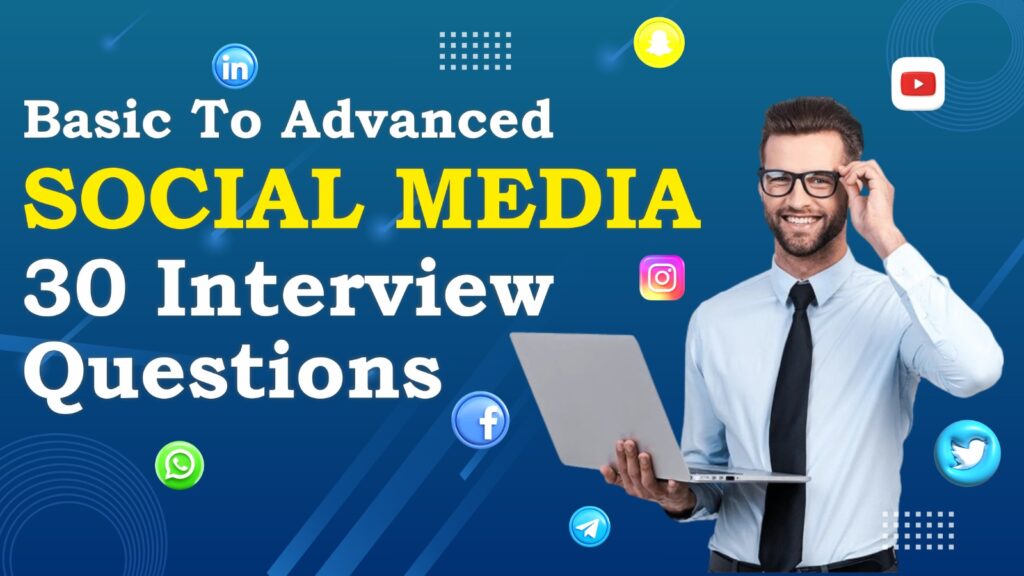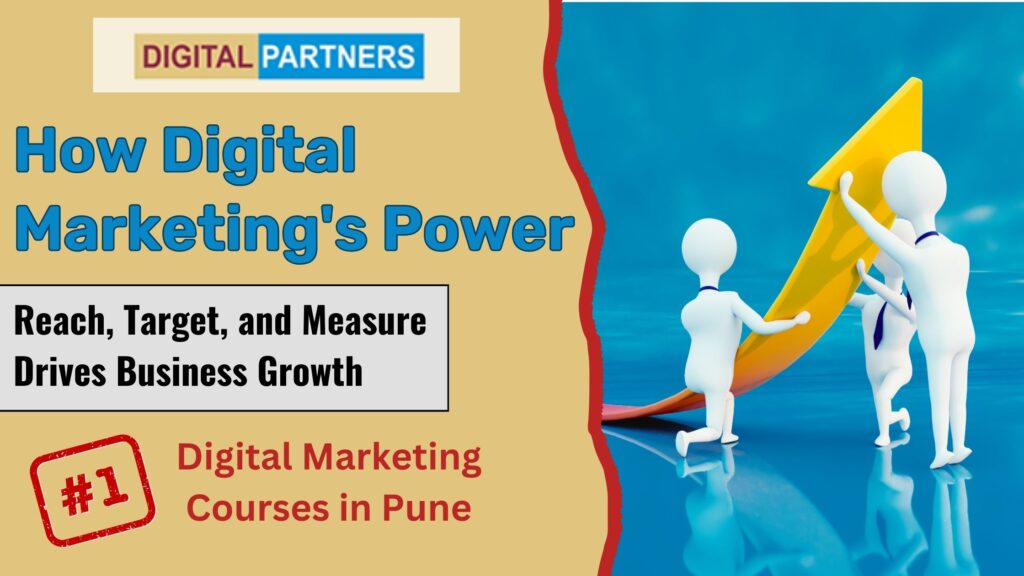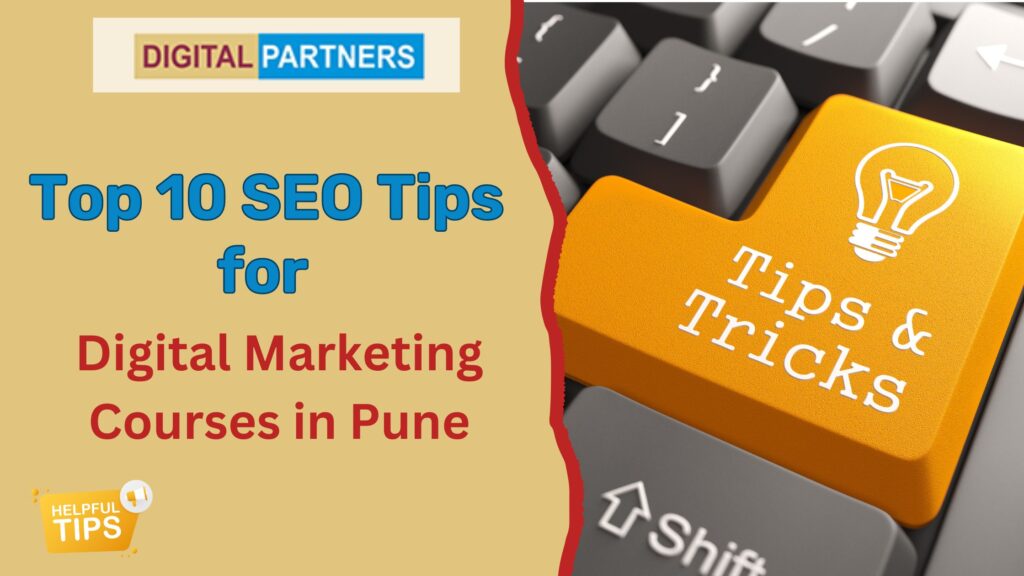Introduction:
In today’s digital age, proficiency in social media is a vital skill for anyone venturing into the field of digital marketing. Whether you’re a seasoned professional or just starting out, mastering the intricacies of social media can significantly boost your career prospects. To help you prepare for your next interview and navigate the dynamic landscape of social media marketing, we’ve compiled a comprehensive list of 30 interview questions ranging from basic concepts to advanced strategies. From understanding algorithms to crafting engaging content, these questions cover all aspects of social media marketing. Additionally, for those looking to deepen their knowledge and skills, we introduce Digital Partners, a premier training institute in Pune offering both online and offline classes. Let’s dive into the world of social media and unlock its endless possibilities!
What made you decide to pursue a career in social media?
I pursued a career in social media due to my passion for digital communication and its ability to connect people globally. I find joy in creating engaging content and fostering meaningful interactions online, making it a fulfilling career choice for me.
What do you like the most about working in social media marketing?
I enjoy the dynamic nature of social media marketing, where creativity meets strategy in real-time. Engaging with diverse audiences, analyzing trends, and crafting compelling content are exhilarating. Contributing to brand visibility and fostering meaningful connections in the digital sphere fuels my passion for this field.
What are your professional goals?
My professional goal is to continuously grow and excel in my field, leveraging my skills and experiences to make meaningful contributions to projects and teams. I aim to take on increasingly challenging roles that allow me to make a positive impact and achieve personal fulfillment in my career journey.
Why did you become a social media executive?
I became a social media executive because I’m passionate about leveraging digital platforms to connect people and brands. With a knack for creativity and strategy, I saw an opportunity to make meaningful impact in shaping online conversations and driving engagement. It’s a dynamic field where I can thrive.
What are some essential skills for social media executives and do you have them?
Essential skills for social media executives include strategic planning, content creation, analytics interpretation, and community management. As an experienced candidate, I possess these skills demonstrated through successful campaigns, engagement metrics, and a deep understanding of platform algorithms and trends.
Do you have experience using social media automation, scheduling and analysis tools?
Yes, I’m proficient in utilizing social media automation, scheduling, and analysis tools. I have experience with platforms like Hootsuite, Buffer, and Sprout Social for scheduling posts and analyzing engagement metrics. These tools streamline content management and provide valuable insights for strategic decision-making.
What is your educational background and training?
I hold a Bachelor’s degree in (Computer Science) from (XYZ University). Additionally, I have undergone extensive training in digital marketing through courses at Digital Partners in Pune. This combination equips me with both theoretical knowledge and practical skills relevant to the position.
Do you know how to create a social media editorial calendar?
Yes, I do. A social media editorial calendar is crucial for planning content. It involves outlining themes, scheduling posts, and aligning with marketing goals. By organizing content in advance, it ensures consistency and timely delivery, optimizing engagement and audience reach.
Have you created social media analytics reports?
Yes, I have experience creating social media analytics reports. In my previous role, I analyzed engagement metrics, audience demographics, and content performance across platforms. I utilized tools like Google Analytics and social media analytics platforms to compile comprehensive reports for strategic decision-making
Which social media platforms do you have experience managing?
I have experience managing various social media platforms including Facebook, Twitter, Instagram, LinkedIn. I’m proficient in creating content, analyzing engagement metrics, and implementing strategies to increase brand visibility and engagement across these platforms.
How do you stay updated with the latest social media trends?
I stay updated with the latest social media trends by regularly following industry blogs, attending webinars, and joining relevant online communities. Additionally, I engage with influencers and actively participate in social media platforms to observe emerging trends firsthand. Continuous learning and adaptation are key to staying ahead in this dynamic landscape.
Have you ever created paid social media advertisements?
Yes, I have experience creating paid social media advertisements. I’ve developed campaigns across various platforms to effectively target specific audiences and achieve desired objectives. My proficiency includes crafting compelling ad copy, designing engaging visuals, and optimizing campaigns for maximum ROI.
What are the vital elements of an effective social media campaign?
An effective social media campaign hinges on several key elements. These include clear objectives, audience targeting, engaging content, consistent branding, timely responses, and performance tracking. By incorporating these elements, brands can maximize their reach, engagement, and ultimately, achieve their marketing goals.
What is the best time to publish a post?
The best time to publish a post depends on your audience’s behavior. Analyze metrics like engagement rates and peak activity times on social media platforms to determine optimal posting times. Experiment with different schedules to find what works best for your specific audience and content.
What is the most accurate measure of engagement on social media?
The most accurate measure of engagement on social media is typically determined by analyzing multiple metrics such as likes, shares, comments, and click-through rates. However, the specific measure that best reflects engagement may vary depending on the platform and the goals of the campaign.
How do you identify and target the right audience for a post?
To identify and target the right audience for a post, I begin by analyzing demographics, interests, and behaviors using tools like Google Analytics and social media insights. Then, I tailor the content to resonate with their preferences and needs, ensuring maximum engagement and relevance.
What are some ways you can identify and block spam accounts?
To identify and block spam accounts, employ advanced algorithms to detect unusual activity patterns such as mass following, repetitive posting, or suspicious account creation behavior. Utilize machine learning models trained on vast datasets to flag and filter out spam content. Additionally, implement CAPTCHA challenges, email verification processes, and IP address monitoring to thwart automated spamming attempts effectively.
What is the one aspect you want to change about social media?
One aspect I’d change about social media is fostering healthier online interactions. Many platforms prioritize engagement over well-being, leading to toxic behavior and mental health issues. Implementing features that promote empathy, discourage cyberbullying, and limit the spread of harmful content would create a more positive digital environment where users feel safe and supported.
What is the role of A/B testing in refining social media communication?
A/B testing plays a crucial role in refining social media communication by enabling marketers to compare different versions of content or strategies to determine which performs better with their audience. By systematically testing variables like headlines, visuals, or posting times, companies can make data-driven decisions to optimize engagement, reach, and ultimately, their social media ROI.
How do you measure the return on investment of social media campaigns?
To measure the ROI of social media campaigns, I use a combination of metrics like engagement rates, click-through rates, conversions, and customer acquisition cost. By tracking these key performance indicators (KPIs) and comparing them against the campaign’s costs, I can accurately evaluate the effectiveness of our social media efforts in driving tangible results and achieving our business objectives.
How do you stay updated with the latest trends and changes in social media algorithms?
To stay updated on social media trends and algorithms, I actively engage with industry blogs, follow key influencers, and participate in relevant online communities. Additionally, I regularly attend webinars and conferences to glean insights from industry experts. Continuous learning and adapting strategies based on new information are integral to effectively navigating the ever-evolving landscape of social media.
What strategies do you employ to increase organic reach and engagement on social media channels?
To enhance organic reach and engagement on social media, I focus on creating compelling content tailored to each platform’s audience. Utilizing relevant hashtags, posting consistently, and engaging with followers through comments and messages are key strategies. Additionally, I leverage analytics to understand audience preferences and optimize content accordingly, fostering meaningful interactions and growing organic reach over time.
How do you measure the ROI of social media marketing efforts?
To measure the ROI of social media marketing efforts, we employ various metrics such as conversion rates, engagement levels, and customer acquisition costs. By tracking these indicators alongside specific campaign goals, we can assess the effectiveness of our strategies. Additionally, tools like Google Analytics and social media analytics platforms provide valuable insights into user behavior, enabling us to refine our approach for optimal results.
What are the elements of a viral video?
The elements of a viral video typically include captivating content, emotional appeal, relatability, concise storytelling, authenticity, shareability, and timing. Capturing attention within the first few seconds is crucial, along with evoking strong emotions like humor, awe, or empathy. A clear call-to-action encourages sharing, while leveraging current trends or addressing universal themes enhances virality potential. Timing the release to coincide with peak online activity can also boost success.
How can LinkedIn be used for marketing?
LinkedIn can be utilized for marketing by creating a compelling company page, engaging with relevant content, and participating in industry groups. Leveraging LinkedIn’s advertising options, such as sponsored content and targeted ads, can expand reach. Additionally, fostering connections with potential clients or partners and utilizing LinkedIn’s analytics to measure performance are key strategies for effective marketing on the platform.
How RSS feed works and how it matters?
RSS (Really Simple Syndication) works by allowing users to subscribe to content feeds from websites. Publishers update their feeds with new content, which is then automatically delivered to subscribers’ RSS readers. This matters because it enables users to access the latest content from multiple sources in one place, saving time and providing a centralized way to stay updated on topics of interest.
social media marketing tools:
Social media marketers often rely on a variety of tools to enhance their strategies. Some popular ones include Hootsuite for scheduling posts, Buffer for managing multiple accounts, Canva for creating visually appealing content, Sprout Social for analytics, and BuzzSumo for content discovery. These tools streamline processes and help optimize social media campaigns effectively.
How do you handle bad feedback or comments on social media?
I view bad feedback as an opportunity for growth. Firstly, I assess the validity of the criticism and reflect on how I can improve. Then, I respond respectfully, addressing concerns and offering solutions. Additionally, I use it to refine my approach and enhance future interactions. Ultimately, constructive criticism fuels my personal and professional development.
What does KPI mean in social media?
KPI stands for Key Performance Indicator. In social media, KPIs are metrics used to measure the effectiveness of a company’s social media efforts. These can include metrics such as engagement rate, reach, click-through rate, and conversion rate. KPIs help assess the success of social media campaigns and inform strategies for improvement.
When would you use a hashtag?
Hashtags are used on social media platforms to categorize content and make it discoverable to a wider audience. They are employed when you want to join or start a conversation around a specific topic, event, or trend. By including relevant hashtags in your posts, you increase their visibility and engagement potential, helping you connect with others who share similar interests or opinions.
Conclusion:
Mastering social media marketing is essential for anyone looking to excel in the digital landscape. By understanding the nuances of various platforms and staying updated on industry trends, you can leverage social media to drive business growth and enhance brand presence. Whether you’re a beginner or an experienced marketer, continuous learning and practical experience are key to staying ahead in this dynamic field. Consider enrolling in Digital Partners, Pune’s leading digital marketing institute, to gain comprehensive training and hands-on experience in social media marketing. Start your journey from basic concepts to advanced strategies, and unlock the full potential of social media for your career success.



